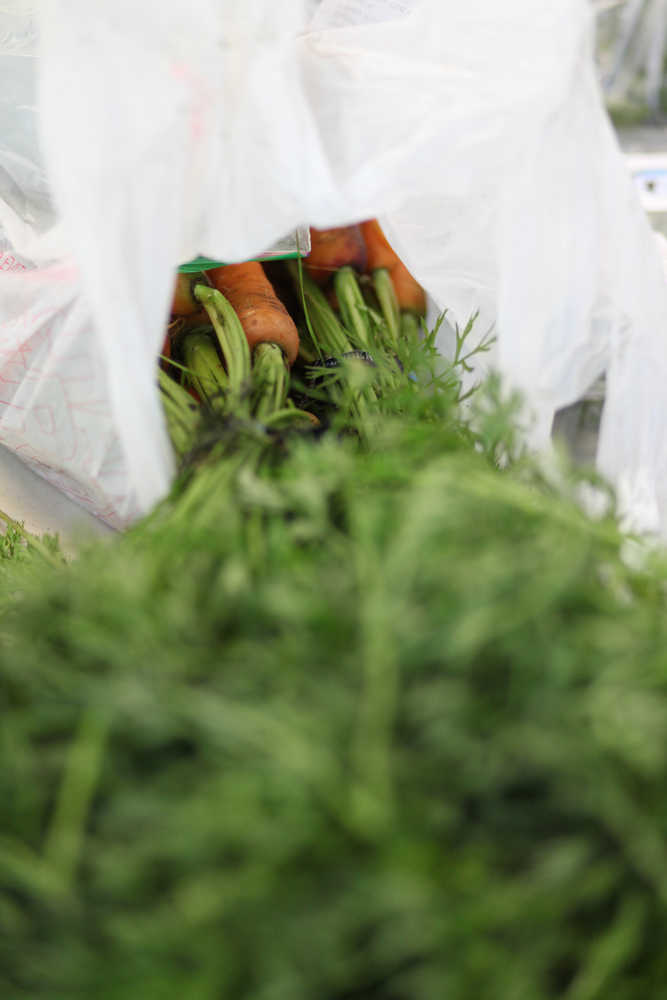As the season extends, so has the reach of the Kenai Peninsula Food Hub.
More sellers sign up on the central Kenai Peninsula, in Homer and now Seldovia, each week, bringing with them a variety of fresh local produce, honey, seafood, and this week, the first peonies.
Perhaps, equally as important, the market has kept up. Right now, Chet Williams, owner of Funny River Farms, in its third year of production, sells half of his vegetable hoard through the online marketplace.
“That has pretty much allowed me to sell everything I wanted to sell,” he said.
Before starting his new career as a farmer a few years ago, Williams said “he hadn’t grown a tomato in his life,” which is why he sells what he knew would work best, like carrots and kale, hardy enough to withstand soil that stays below 40 degrees Fahrenheit until late spring and tops out midsummer. Monday, he slogged up and down rows of snap peas in his high tunnel that reached 100 degrees Fahrenheit.
What product he doesn’t deal out through the food hub he sits with at the Farmer’s Fresh Market Tuesday’s from 3-6 p.m. at the Kenai Peninsula Food Bank. Like a few other growers on the website, Williams is utilizing one of the many other resources Steve Dahl, volunteer coordinator for the central Kenai Peninsula sales, said will help local farmers get the leg up they need to maintain and expand operations.
Dahl and his wife Lou Heite sell fresh greens, herbs and “pretty soon new potatoes,” between 40-50 percent of their total yield, through the food hub. If not there, they would market at delis, farmers markets and restaurants, he said.
“If you don’t sell it at one place, I am not going to throw it away,” Dahl said. “I am going to take it to the next.”
The revenue they make this year will assist in their plans to build more greenhouses and continue to cultivate their raw boreal forest-turned-farmland into more habitable soil.
Jessica England, who runs Abundant Blessings Farms with her husband Abraham, said the money they make from their egg sales through the hub wouldn’t help them buy more chickens. It does incentivize the young couple to keep the roughly 75 birds that fertilize ground they grow their vegetables in, the yields of which will be on the food hub and at local farmers markets by August.
“It gives us more ways to keep at it and keep going,” she said.
It also takes less time than other outlets, England said. This summer, while regularly fraught with morning sickness, spending hours preparing cartons one afternoon, and then sitting with them for hours at a farmers market the next was too far from appealing.
With the food hub, producers know exactly how much to prepare the day before weekly Tuesday drop-offs at the Christ Lutheran Church in Soldotna, England said. At a farmers market it can be somewhat of a guessing game as to how much will sell, so preparation, transportation and face time are all cut down going through the food hub, she said.
“The goal of the Food Hub is to provide opportunities for Kenai Peninsula producers and consumers to connect in a way that will create benefit for both, as well as strengthen the Kenai Peninsula economy, increase food security, and reduce the carbon footprint created from importing,” said Robbi Mixon, local foods coordinator for Cook Inletkeeper, which is hosting the website.
Producers can sell whatever they like “from one carrot or one hundred pounds,” after going through a vetting process, Mixon said. Seller price their own product, according to rules published on the website, kenaifoodhub.com.
For Williams, and Echo Lake Peonies owner Irene Repper, the freed up time, means more opportunity to tend the crops. The peony season came almost a month early for many growers in the central Kenai Peninsula, and right now every extra moment is dedicated to deadheading, irrigating and fertilizing, she said.
Packing peonies is also labor intensive, which requires a string of details to be worked out between the Reppers, florists or anxious brides ahead of time. Taking whatever blooms are left to the farmers market is a more streamlined process, she said.
It also helps to get rid of what can’t be sold that requires shipping. Peonies must be picked and packed before buds have bloomed. Once petals are popping, they are only marketable locally, Repper said.
Joining this year “seemed like a no brianer,” for Williams. The drop-off and pick up location at Christ Lutheran Church in Soldotna is central and generally convenient, and getting in while the new service is on the ground floor seemed exciting enough.
“As we progress into next season, the idea is that consumers will see the Food Hub as a viable option and the demand will increase, thus increasing sales and production of local products,” Mixon said.
Reach Kelly Sullivan at kelly.sullivan@peninsulaclarion.com.

